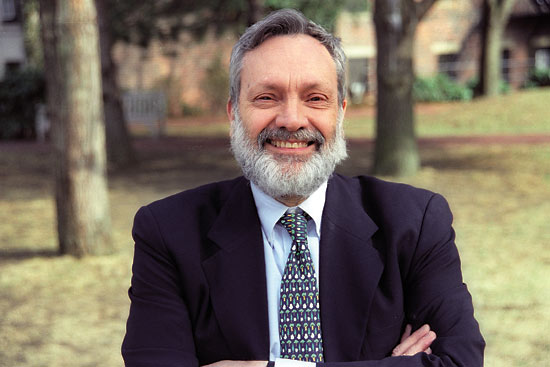Partnering for Global Health
BU Begins Series of Collaborations with Indian Public Health Community
| From Commonwealth | By Chris Berdik
 Gerald Keusch is director of BU’s Global Health Initiative, which is collaborating with India on research and treatment, such as developing vaccines to treat emerging infectious diseases.
Gerald Keusch is director of BU’s Global Health Initiative, which is collaborating with India on research and treatment, such as developing vaccines to treat emerging infectious diseases.
Every year about two million people in India are diagnosed with malaria, a disease that hits pregnant women particularly hard. The mosquito-borne infection can lead to miscarriages, low birth weight, premature birth, and maternal anemia.
Public health officials in India advise pregnant women to sleep under insecticide-treated mosquito nets and to take antimalarial medication. But putting those seemingly simple recommendations to work is not so easy.
While bed nets are plentiful, insecticide-treated nets are in short supply, says David Hamer, a School of Public Health associate professor of international health, who is leading two studies in India of malaria in pregnancy. And while chloroquine is readily available, he adds, “pregnant women believe rumors that the drug causes miscarriages or other problems with the baby and are afraid to take it.”
When Hamer shares his findings about the prevalence of malaria in pregnancy with Indian public health officials, he will also work with them to strengthen their malaria prevention guidelines.
His project represents the type of broad-based collaboration between BU and India’s public health community that will expand in the years ahead, thanks to a coordinated series of education and research agreements crafted by BU’s Global Health Initiative (GHI). There are plans for joint research on infectious diseases, for student and faculty exchanges, and for training programs for public health officials. The collaborations will focus on things ranging from basic science to pharmaceutical development to the evaluation of public health interventions.
“We’re trying to do this A-to-Z approach, to put these pieces together from basic science to implementation and evaluation,” says Gerald Keusch, Medical Campus associate provost for global health, an SPH professor of international health and associate dean of global health, and GHI director.
In one agreement, BU researchers in the National Emerging Infectious Diseases Laboratories (NEIDL) will partner with Indian virologists who track new outbreaks of infectious diseases.
BU has also created a course to help Indian researchers and medical professionals to become public health educators. The training is intended to alleviate India’s shortage of public health workers, which leaves public hospitals and clinics understaffed by about 20 percent.
In another agreement, a new UNESCO Regional Center for Education, Training, and Innovation will be developed to teach Indian scientists to work in that country’s biotechnology sector, translating research into products for patient care.
“The idea behind the new center is to put a public health perspective on the biotech industry so that it serves the needs of India and the region, rather than just working to develop the next Viagra or other lifestyle drug to sell at a great profit,” says Keusch.
In a related pact, the Serum Institute of India, a privately held pharmaceutical company that makes more than half of the vaccines that UNICEF distributes all over the world, will work with NEIDL researchers on the rapid development of vaccines to treat emerging infectious diseases in India and South Asia.

 Twitter
Twitter Facebook
Facebook
Post Your Comment